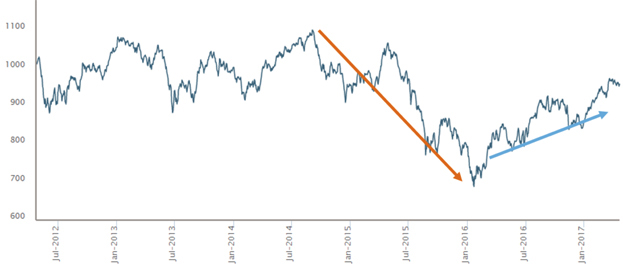Emerging Markets: Finding value through specialists and dynamic management
Are you giving emerging markets the attention they deserve? We believe emerging markets deserve at least as much time and effort as developed market allocations. The longer-term growth projection (in GDP, population and consumption) shows that by 2025, emerging markets may represent over 45% of global consumption.1 Many multi-asset portfolios could benefit from this kind of exposure when done in combination with dynamic management.
Attractive relative value
The past few years have been challenging for emerging markets (see chart) This has created a gap in relative performance which makes emerging markets valuations attractive on a longer-term perspective. Meanwhile on a cyclical basis, though the Trump presidency creates short-term uncertainty for emerging markets, we feel the overall outlook includes positive implications. See our blog for more about the ramifications of Trump on emerging markets.
Source: MSCI Emerging Markets Daily Performance as at Thursday 20 April 2017
Beta versus alpha—finding specialist managers
The largest emerging market stocks are well covered by the broker community. You can acquire beta exposure to this asset class by buying an ETF, but investors going down this route are at risk of leaving a lot of potential alpha on the table. Because of this, many investors tend to allocate to emerging markets via their global equity manager. Most managers will typically give investors access to well-known large-market and large capitalization stocks, generally in a handful of countries, and relatively concentrated exposure. Furthermore, these stocks are well researched and widely held. While this route does carry some benefits, it makes it harder to find the unloved heroes with high alpha potential.
Meanwhile, smaller stocks and those in the frontier markets (the next generation emerging markets) can reflect the truer emerging economies, incorporating broader-growth themes such as growing middle-class consumers. However, they tend to have little or limited broker coverage. As such, they are likely to be less efficiently priced, which can create good opportunities, idiosyncratic properties and higher alpha potential for active managers. To access these companies, we believe you need to work hard to seek out and employ specialist managers.
We believe finding these experts takes much greater research, resource and expertise. In our view, it’s more meaningful to take the time to investigate the quality of the team and the robustness of their process, rather than focus on past performance. We believe this is a more successful way to source specialists and access those higher alpha stocks.
Pursue dynamic exposures as well as managers
Aside from identifying skilled managers, there are several ways to create a consistent and strong returning portfolio. Without dynamic management and an intelligent understanding of the investment universe and market cycle, short-term risks can dominate portfolio performance—with varying results. Applying a dynamic multi-asset framework that seeks to combine complementary investment exposures could help to deliver a smoother outperformance profile.
Accessing the best emerging market opportunities
There are plenty of opportunities to explore in emerging markets. We believe seeking out the best-in-class active managers is vital to exploiting these opportunities in order to deliver a rich source of alpha. But, it’s the intelligent and dynamic combining of these specialists that may help diversify your portfolio’s risk and return profile successfully.
1Angus Maddison, founder of Groningen Growth and Development Centre, University of Groningen, Homi Kharas, senior fellow at Wolfensohn Center of Development at Brookings Institution; McKinsey Global Institute analysis.
